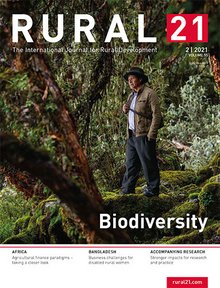Vol. 55 No. 2/2021: Biodiversity

In mid-June 2021 the UN Decade on Ecosystem Restoration was officially launched by the UN General Assembly. It follows the UN Decade on Biodiversity, which closed with the sobering assessment that none of the targets which the international community had set itself on world-wide conservation of biodiversity, the so-called Aichi Targets, had been fully achieved. On the contrary, never before has species extinction progressed as rapidly as during the last 100 years. And this is happening despite our all being fully aware that biological diversity and its related ecosystem services – such as food, clean water, clean air and natural ingredients of medicines, to name just a few – are essential for the survival of humankind.
When the UN Decade on Ecosystem Restoration draws to a close, we will also have reached the target year of Agenda 2030, the year by which the Sustainable Development Goals (SDGs) ought to have been achieved. All of us know that the majority of these Goals cannot be reached if the current pace of biological extinction is not slowed down. And since the corona pandemic at the latest, it has become unambiguously clear just how closely the well-being of humans and that of nature are linked. So it is high time for us to rethink and completely revise our relationship with nature.
One opportunity for this comes up this year’s October, when the international community gathers in Kunming, China, at the 15th Conference of the Parties of the UN Convention on Biological Diversity (COP15) to negotiate a new global biodiversity framework. What do we expect from these talks? We couldn’t put it better than Christian Schwarzer, Founding Member of the Global Youth Biodiversity Network, who said at the recent European Development Days: “I want you to fight for biodiversity as if the life of your beloved family were at stake.”
Focus
- Protecting biodiversity requires transforming human-nature relations
- The Convention on Biological Diversity and the Aichi Targets
- The economics of biodiversity
- Food system transformation starts and ends with diversity
- Why conserving 30 per cent of the planet’s land and seas is critical – and how to achieve this
- Why a 30 per cent blanket target on protected areas is not enough
- Connecting people and nature – UNESCO biosphere reserves in Ghana
- Facts and figures on biodiversity and ecosystem services
- Biodiversity and agriculture – rivalry or a new friendship?
- "We must thoroughly change how we use our land and seas"
- Shaping the transformative change – development cooperation’s role
- The Agrobiodiversity Index
- Agrobiodiversity and integrated seed systems to improve smallholder livelihoods
- Conserving biodiversity, meeting people’s needs



